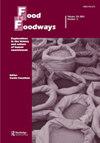“Because I saw my mother cooking”: the sociocultural process of learning and teaching domestic culinary skills of the Western Brazilian Amazonian women
IF 1.1
Q2 ANTHROPOLOGY
引用次数: 2
Abstract
Abstract This article describes and discusses the sociocultural process of learning and teaching women’s domestic culinary skills. Drawing on descriptive qualitative research, we conducted an in-depth analysis of semi-structured interviews with 16 cisgender women who cooked at home at least once a day and lived in Cruzeiro do Sul, Acre state, Brazilian Western Amazon. Our results suggest that women develop their domestic cooking skills at different moments. In childhood, the women interviewed were taught by their maternal figures and learned the required culinary skills to prepare “Rainforest Foods,” traditional foods in their original places. In adulthood, female employers taught them the culinary skills needed to prepare “City food,” meals made with ingredients, tools, and cooking methods available in the urban area. Notably, the women interviewed also reported being taught by their husbands to cook foods that met their tastes and eating patterns. In contrast, women teach their sons and daughters culinary skills to develop their food autonomy and promote the egalitarian division of domestic culinary work. These findings are essential to understand the sociocultural process of learning and teaching domestic culinary skills among communities or membership groups who lived in forest or rural areas and migrated to urban centers.“因为我看到我的母亲做饭”:巴西西部亚马逊妇女学习和教授家庭烹饪技能的社会文化过程
摘要本文描述并探讨了女性家庭烹饪技能学习与传授的社会文化过程。利用描述性定性研究,我们对16名居住在巴西西亚马逊阿克州南克鲁塞罗的顺性女性进行了半结构化访谈,深入分析了这些女性每天至少在家做饭一次。我们的研究结果表明,女性在不同时期学习家庭烹饪技能。在童年时期,接受采访的妇女接受母亲形象的教导,学习制作“热带雨林食品”所需的烹饪技巧,这是在原籍地制作的传统食品。成年后,女性雇主教她们准备“城市食物”所需的烹饪技巧,即用城市地区可用的食材、工具和烹饪方法制作的饭菜。值得注意的是,接受采访的女性还报告说,她们的丈夫教她们烹饪符合自己口味和饮食习惯的食物。与此相反,妇女教子女烹饪技巧,以培养他们的食物自主权,并促进家庭烹饪工作的平等分工。这些发现对于了解居住在森林或农村地区并迁移到城市中心的社区或成员群体学习和教授家庭烹饪技能的社会文化过程至关重要。
本文章由计算机程序翻译,如有差异,请以英文原文为准。
求助全文
约1分钟内获得全文
求助全文
来源期刊

Food and Foodways
ANTHROPOLOGY-
CiteScore
2.20
自引率
0.00%
发文量
16
期刊介绍:
Food and Foodways is a refereed, interdisciplinary, and international journal devoted to publishing original scholarly articles on the history and culture of human nourishment. By reflecting on the role food plays in human relations, this unique journal explores the powerful but often subtle ways in which food has shaped, and shapes, our lives socially, economically, politically, mentally, nutritionally, and morally. Because food is a pervasive social phenomenon, it cannot be approached by any one discipline. We encourage articles that engage dialogue, debate, and exchange across disciplines.
 求助内容:
求助内容: 应助结果提醒方式:
应助结果提醒方式:


